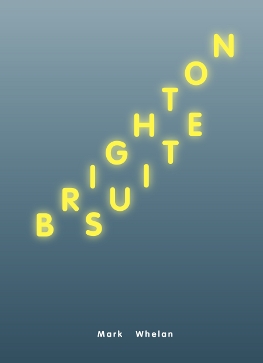
A Symphonic Poem; Review of Brighton Suite by Mark Whelan
Uncategorized October 27, 2012The structure Mark Whelan gives Brighton Suite, his new collection of poems from Pighog Press, makes me believe he spends a good deal of time at the orchestra. Reading this beautiful chapbook, I am reminded of the tone poems of Frederick Delius and Richard Strauss. Whelan utilizes prelude, andante, sonata, and finale on the Contents page to compositionally break up the poems, and, once these poems are encountered, it’s clear these designations (dare I say movements?) work. Looking at Whelan’s layout brings to mind Delius’s Florida Suite and Gustav Mahler’s programmatic Third Symphony.
Whelan’s first poem establishes the engaging style he uses throughout most of the book: lack of punctuation, caesuras suggested with spaces, the foregoing of capitalization. Poetry generally unravels on the page slower than those of prose, and the words waiting to be enjoyed in Brighton Suite not only please the eye, but soften the light of our afternoon. “I Would Stand” repeats the title six times without sounding ponderous as he wends his way down the poem, and it was in this poem I came across a line I like to refer to as one I wish I had written:
I would stand with you
as twin finches breathe
in the depthed hollowof a holy well
No end stop, a space for a pause, techniques Whalen uses as poetically as Strauss employed French horns in his Till Eulenspeigel.
W.S. Merwin, one of my favorite poets, has brought his work to the point of gentle concentration, inking poems that reward us during the read. I now include Whelan in the same group as Merwin.
It is refreshing to read erotic poems written by a male that set aside the ‘icky’ feeling of locker-room banter. “Airborn” brings us to intimacy without being voyeuristic:
Let me take you to my small bed
spiral inward toward the veil of
your nakedness make a space around you
a wet potency of channelssoothing reflections bouncing off wing-feathers
caught for the moment by a sudden sun
The answer to the question ‘Which Brahms symphony is your favorite?’ is always ‘The one I’m listening to now.’ I can now apply this aphorism to Mark Whelan’s poems, and I’m sure to procure his other two books – Scarecrow Diptych (2003), and Always Pushing the Pull Door (2007). “O Bhéal” (pronounced ‘Oh-Vay-oll’), another of Mark’s intimate poems, deftly uses refrains related to that most personal of places, the mouth:
Of the mouth
intimate pulse in a downpour of rain
Of the mouth
inexplicable symbols of a dreaming otter
Of the mouth
poem ablaze in silence
“Bourne Court Andante” uses a left-margin/right-margin flush movement down the page that hypnotizes with its dream-like images, and the reader meets the first forms of punctuation in the book: ellipses, question marks, and exclamation points. Enjoy this male P.O.V. poetry:
Was it yesterday you arrived here
with the applewhite-softness of your beasts
with your naked belly full of life full of spring
with your skin of perfumed moonmoss was that you?
At this point we need to supply pauses without spaces, and Whelan trusts we can do it on our own. I believe his book would have had more unity had he continued downstream with no upper case, but here they appear, and do so through the remainder of the book. “Beneath” breaks the pattern, bringing us back one last time to that style, reminding us of Whelan’s mastery early on, forcing us again to slow down, to provide our own line breaks and end stops. The last bars of Mr. Whelan’s “Finale” come in the poem “White Roses”:
And the white rose of shadows
it leaves its petal-less image
on the wall of all that was and never was
In the general repertory, the finale of a symphony considered the gentlest comes in the Brahms Third, and I’m moved to note Whelan ends his symphonic poem Brighton Suite in that same key of F.
available now from Pighog Press

